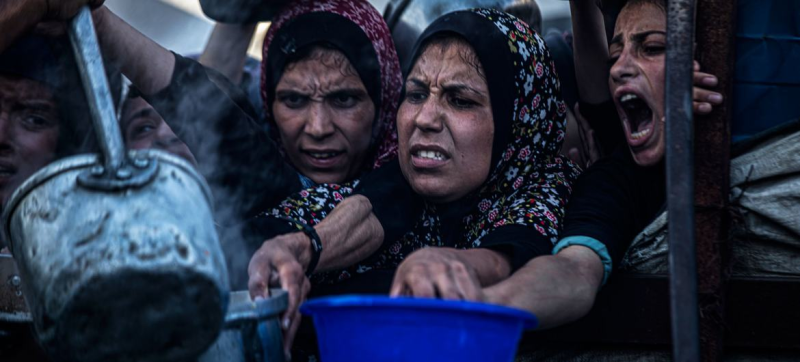- India Sees 9% Drop in Foreign Tourists as Bangladesh Visits Plunge |
- Dhaka Urges Restraint in Pakistan-Afghan War |
- Guterres Urges Action on Safe Migration Pact |
- OpenAI Raises $110B in Amazon-Led Funding |
- Puppet show enchants Children as Boi Mela comes alive on day 2 |
Guterres Slams Use of Hunger as Weapon in Gaza, Sudan Wars

Women in Gaza desperately seek food.
As starvation worsens in war-torn Gaza, UN agencies reiterated warnings on Monday that Israel’s decision to support a “one-week scale-up” of aid is far from sufficient to reverse deadly malnutrition rates in the enclave.
The development comes as UN Secretary-General António Guterres cautioned that conflict-driven hunger is spreading “from Gaza to Sudan and beyond”.
“Hunger fuels instability and undermines peace. We must never accept hunger as a weapon of war,” he said in a video message to the UN Food Systems Summit Stocktake in Addis Ababa.
Meanwhile, citing reports that “more children died today of hunger”, the UN agency for Palestinian refugees, UNRWA, said it hopes to receive permission to bring in thousands of trucks loaded with food, medicine, and hygiene supplies that Israel has blocked from entering Gaza for months.
“They are currently in Jordan and Egypt waiting for the green light,” the UN agency explained, adding that “at least 500 to 600 trucks” are needed daily to prevent more people from starving. More than 100 people have already died of starvation in Gaza, according to UNRWA, while local health authority reports indicate over 40 deaths from malnutrition this month alone.
“Opening all the crossings and flooding Gaza with assistance is the only way to avert a further deepening of starvation among the people of Gaza,” the UN agency maintained.
These comments follow a major policy shift over the weekend, when the Israeli army announced the establishment of a daily humanitarian pause from 10 a.m. to 8 p.m. local time, in areas where its troops are not active. Child malnutrition has been on the rise in Gaza, particularly since 2 March, when Israel imposed a near-total blockade, UNRWA has said.
According to a map provided by Israeli authorities, the humanitarian pause applies to a thin strip of Gaza encompassing Al-Mawasi in the southwest, Deir Al-Balah in the centre, and Gaza City in the north.
On Sunday, a convoy of more than 100 trucks carrying aid supplies reportedly entered the Strip via the Kerem Shalom border crossing in the south.
While welcoming the development, the UN aid coordination office, OCHA, highlighted the staggering scale of needs on the ground in Gaza.
One in three people “hasn’t eaten for days,” insisted Tom Fletcher, UN Emergency Relief Chief and head of OCHA. “People are being shot just trying to get food to feed their families. Children are wasting away. This is what we face on the ground right now.”
In his statement, Mr Fletcher acknowledged “progress” on the aid front but stressed that “vast amounts of aid are needed to stave off famine and a catastrophic health crisis”. He said that UN agencies and the humanitarian community remain mobilised “to save as many lives as we can”.
In addition to Israel’s temporary increase in aid for Gaza, customs restrictions on food, medicine, and fuel from Egypt have reportedly been lifted. Secure routes for UN humanitarian convoys have also been designated.
“We need sustained action, and fast, including quicker clearances for convoys going to the crossing and dispatching into Gaza,” Mr Fletcher said, underscoring the need for “multiple trips per day to the crossings so we and our partners can pick up the cargo; safe routes that avoid crowded areas; and no more attacks on people gathering for food”.
Meanwhile, in New York, France and Saudi Arabia on Monday launched a new diplomatic initiative to push for a two-State solution between Israel and the Palestinian people.
The three-day conference begins as President Emmanuel Macron announced that France will formally recognise Palestine in September — the first of the G7 nations to do so.
A UN General Assembly resolution from 1947 established the partition of Palestine – then under British mandate – into two independent states, one Jewish and the other Arab. The State of Israel was declared in 1948.

